外研版(2019) 选择性必修第四册 Unit 4 Everyday Economics Using language 课件-(28张)
文档属性
| 名称 | 外研版(2019) 选择性必修第四册 Unit 4 Everyday Economics Using language 课件-(28张) | 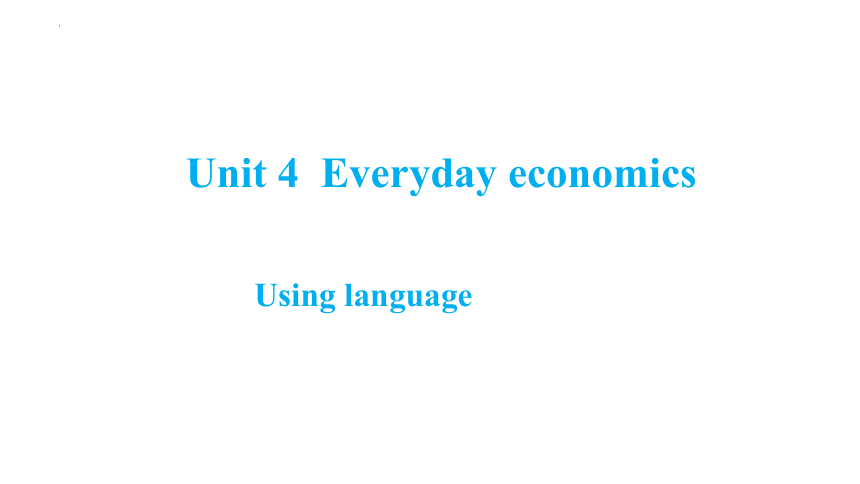 | |
| 格式 | pptx | ||
| 文件大小 | 212.2KB | ||
| 资源类型 | 教案 | ||
| 版本资源 | 外研版(2019) | ||
| 科目 | 英语 | ||
| 更新时间 | 2022-08-03 10:22:23 | ||
图片预览

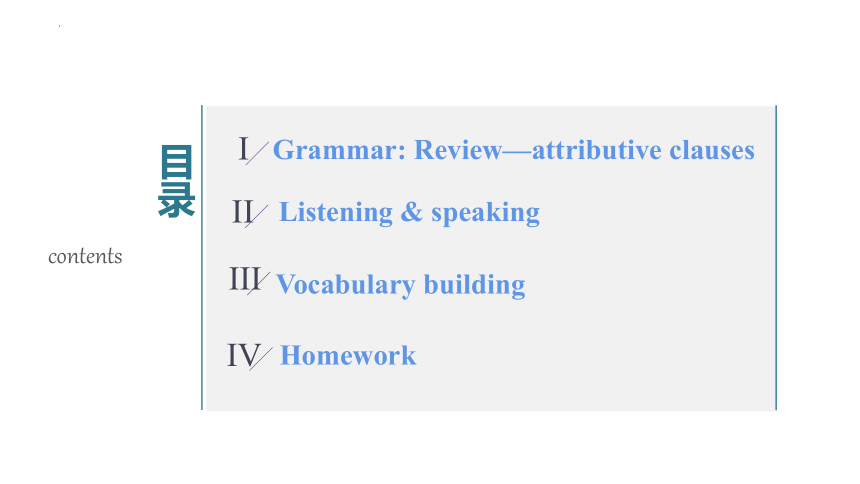
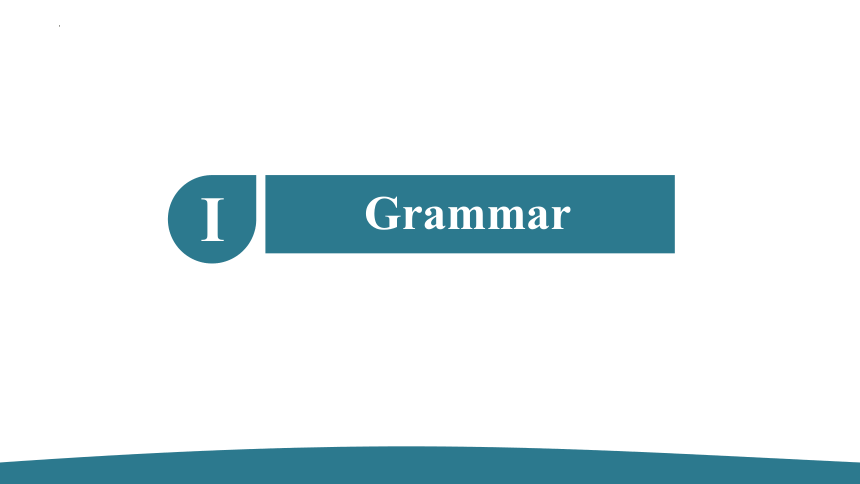
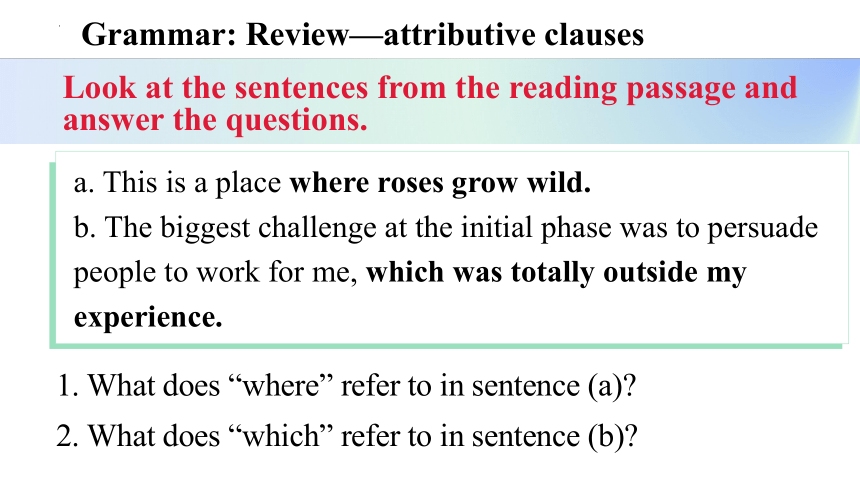
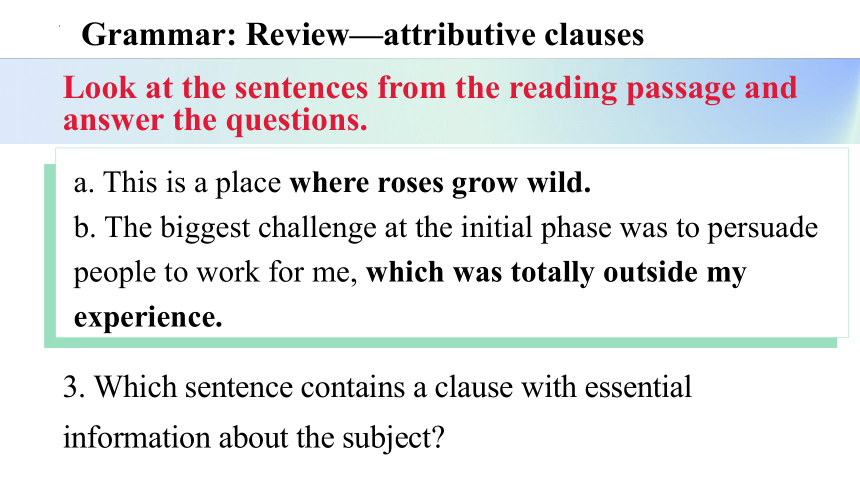
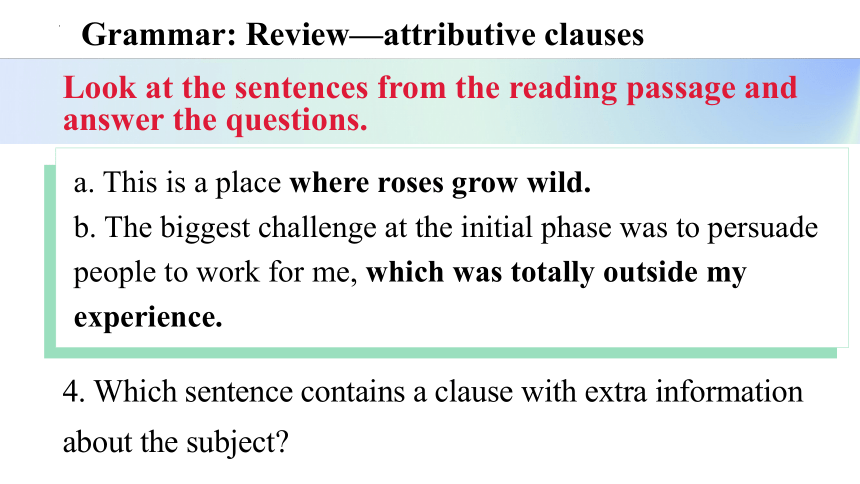
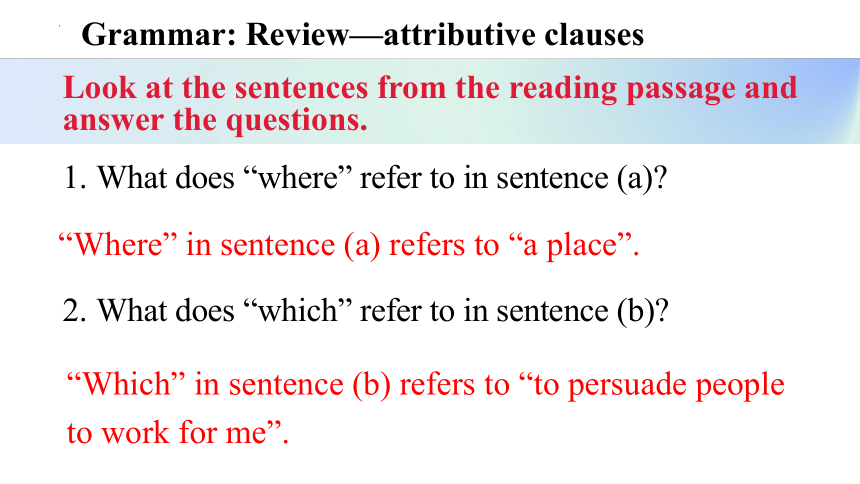
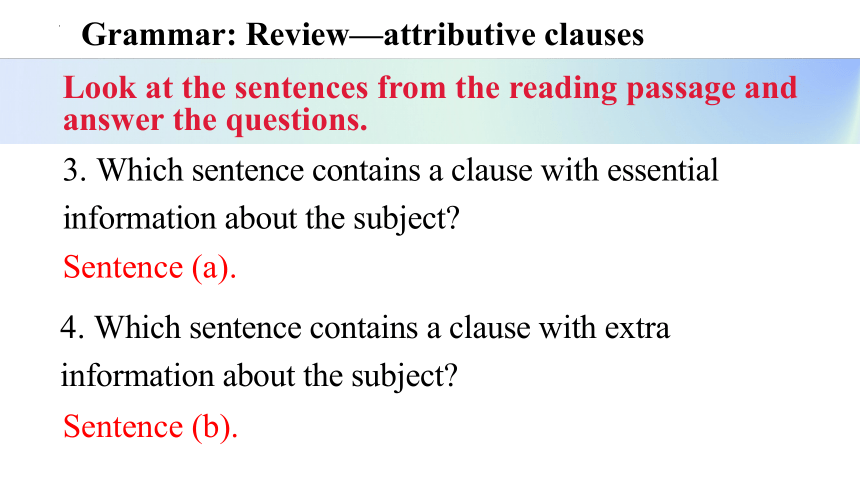
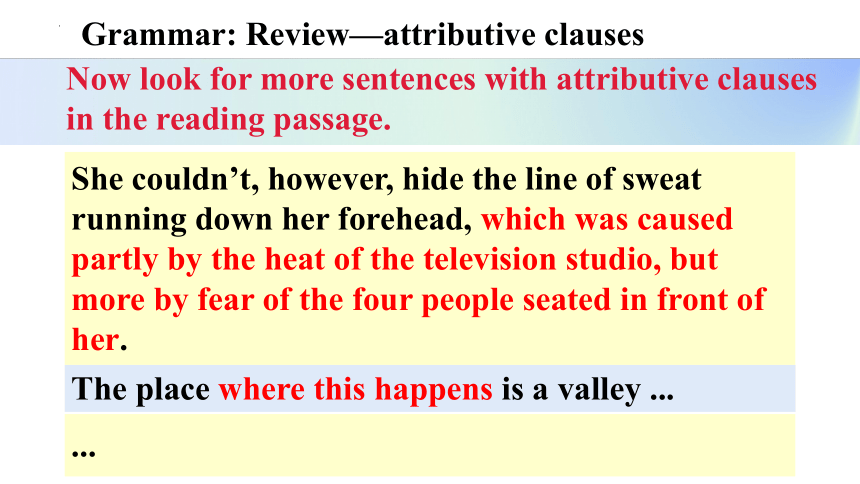
文档简介
(共28张PPT)
Using language
Unit 4 Everyday economics
目录
contents
Grammar: Review—attributive clauses
Listening & speaking
Homework
Vocabulary building
I
II
III
Ⅳ
Grammar
Ⅰ
Grammar: Review—attributive clauses
Look at the sentences from the reading passage and
answer the questions.
a. This is a place where roses grow wild.
b. The biggest challenge at the initial phase was to persuade
people to work for me, which was totally outside my experience.
1. What does “where” refer to in sentence (a)
2. What does “which” refer to in sentence (b)
Look at the sentences from the reading passage and
answer the questions.
3. Which sentence contains a clause with essential information about the subject
a. This is a place where roses grow wild.
b. The biggest challenge at the initial phase was to persuade
people to work for me, which was totally outside my experience.
Grammar: Review—attributive clauses
Look at the sentences from the reading passage and
answer the questions.
4. Which sentence contains a clause with extra information about the subject
Grammar: Review—attributive clauses
a. This is a place where roses grow wild.
b. The biggest challenge at the initial phase was to persuade
people to work for me, which was totally outside my experience.
1. What does “where” refer to in sentence (a)
“Where” in sentence (a) refers to “a place”.
2. What does “which” refer to in sentence (b)
“Which” in sentence (b) refers to “to persuade people to work for me”.
Look at the sentences from the reading passage and
answer the questions.
Grammar: Review—attributive clauses
3. Which sentence contains a clause with essential information about the subject
Sentence (a).
4. Which sentence contains a clause with extra information about the subject
Sentence (b).
Look at the sentences from the reading passage and
answer the questions.
Grammar: Review—attributive clauses
Now look for more sentences with attributive clauses in the reading passage.
The place where this happens is a valley ...
She couldn’t, however, hide the line of sweat running down her forehead, which was caused partly by the heat of the television studio, but more by fear of the four people seated in front of her.
...
Grammar: Review—attributive clauses
定语从句
在复合句中作定语,修饰名词、代词等的从句叫定语从句。
在复合句中,被定语从句修饰的名词、代词等,叫做先行词。引导定语从句的词被称为关系词。
Grammar: Review—attributive clauses
定语从句
先行词
被定语从句修饰的名词、代词等称为先行词。例:This is the museum which was built last year.
先行词一般出现在定语从句之前。
有时先行词是整个句子。例:They sent my child to the school every morning, which I considered a great help to me.
Grammar: Review—attributive clauses
分类 关系词 指代对象 在从句中的作用
关系代词 who 指人 作主语、宾语、表语
whom 指人 作宾语
whose 指人或物 作定语
that 指人或物 作主语、表语或宾语
which 指物 作主语、宾语、表语、定语
as 指人或物 作主语、宾语、表语
关系副词 when 指时间 作时间状语
where 指地点 作地点状语
why 指原因 作原因状语
定语从句中的关系词
Grammar: Review—attributive clauses
定语从句
关系词的作用
引导定语从句
代替先行词
在定语从句中担当一个成分
注意
关系词指代先行词在定语从句中充当成分,因此在定语从句中不能再重复先行词或指先行词的代词。
Grammar: Review—attributive clauses
定语从句的分类
限制性定语从句
非限制性定语从句
作宾语时,可用 who或that替代whom
只可修饰先行词,不可以修饰主句或主句的一部分
翻译成“……的”
和先行词的关系密切,不用逗号分开
可用关系词 that 引导
可以省略关系词(关系词作宾语时)
不可用 who 替代 whom
修饰整个主句或主句的一部分
往往不译为“……的”
和先行词的关系不密切(是补充说明)
不可用关系词 that 来引导
关系词作宾语不可省略
一般使用逗号分开
Grammar: Review—attributive clauses
例如:People who take physical exercise live longer.
(限制性)进行锻炼的人活得长些。
(定语从句修饰 people,若把从句去掉,句子就失去意义)
His daughter, who is in Boston now, is coming here. (非限制性) 他女儿现在在波士顿,她就要来这儿了。
(若把从句去掉句子完整)
Grammar: Review—attributive clauses
that
引导定语从句
引导名词性从句
起引导作用
指代先行词(人或物),
有意义
在定语从句中充当主语、宾语或表语
起引导作用
在名词性从句中不充当任何成分
没有意义
Grammar: Review—attributive clauses
that
引导定语从句
引导名词性从句
例如:
I showed him the nice car that I rented yesterday.
我向他展示了我昨天租的那辆不错的车。
例如:
It’s said that he rented a nice car yesterday.
据说他昨天租了一辆不错的车。
Grammar: Review—attributive clauses
定语从句
I visited Mr and Mrs Smith in New York in 2014, when their first child was born. 我在2014年拜访了住在纽约的 Smith 夫妇,那年他们的第一个孩子出生了。
注意 when、where、why 引导的定语从句与它们引导的状语从句、名词性从句在表意和功能上的区别。
该句中,when 引导定语从句,指代 in 2014,在定语从句中作时间状语。
Grammar: Review—attributive clauses
定语从句
I visited Mr and Mrs Smith in New York when their first child was born.
在 Smith 夫妇第一个孩子出生那年,我在纽约拜访了他们。
该句中,when 引导时间状语从句,整个从句充当时间状语。
Grammar: Review—attributive clauses
定语从句
I visited Mr and Mrs Smith in New York. It was when their first child was born. 我拜访了住在纽约的 Smith夫妇。那年他们的第一个孩子出生了。
该句中,when 为连接副词,引导表语从句。
你能举出 where、why 引导定语从句、状语从句和名词性从句的例子吗?
Grammar: Review—attributive clauses
定语从句
In the museum I saw an old book that was published in the 17th century.
注意定语从句与非谓语动词结构在表意和功能上的异同,以及两者之间的转换。
= In the museum I saw an old book published in the 17th century. 我在博物馆里看见了一本17世纪出版的旧书。
(定语从句修饰先行词 book)
非谓语动词结构修饰名词 book,两者为被动关系
Grammar: Review—attributive clauses
练习:把下列定语从句转换为非谓语动词结构。
① The meeting which is being held now is of great importance.
The meeting ______________ is of great importance.
② Do you know the man who is sitting in the middle of the first row
Do you know the man __________________________
_____
being held now
sitting in the middle of the first
row
Grammar: Review—attributive clauses
Read the passage and rewrite the underlined sentences using attributive clauses.
Good Deal is a local movement in some countries. It works to help farmers and workers in less developed areas receive a better deal for their produce. Good Deal products may be a little more expensive than regular products, but up to one-third of the sale price will be given back to the producers. This is more than they could get under the conventional trading system.
Good Deal is a local movement in some countries(,) which works to help farmers and workers in less developed areas receive a better deal for their produce.
Grammar: Review—attributive clauses
The movement has proven popular among young people, and they want to help producers get the payment they deserve. They have no problem spending a bit more on Good Deal products, believing that their purchasing of these products will help improve local people’s welfare.
The movement has proven popular among young people who want to help producers
get the payment they deserve.
Grammar: Review—attributive clauses
Read the passage and rewrite the underlined sentences using attributive clauses.
However, some people are less optimistic, and argue that it discriminates against producers not part of the Good Deal movement.
However, some people who are less optimistic argue that it discriminates against producers who are not part of the Good Deal movement.
Grammar: Review—attributive clauses
Read the passage and rewrite the underlined sentences using attributive clauses.
Homework
Ⅳ
Homework
1. Summarize the usage of attributive clauses and do the relevant exercises.
2. Think about other words and expressions associated with managing personal finances and write them down.
Thank you
Using language
Unit 4 Everyday economics
目录
contents
Grammar: Review—attributive clauses
Listening & speaking
Homework
Vocabulary building
I
II
III
Ⅳ
Grammar
Ⅰ
Grammar: Review—attributive clauses
Look at the sentences from the reading passage and
answer the questions.
a. This is a place where roses grow wild.
b. The biggest challenge at the initial phase was to persuade
people to work for me, which was totally outside my experience.
1. What does “where” refer to in sentence (a)
2. What does “which” refer to in sentence (b)
Look at the sentences from the reading passage and
answer the questions.
3. Which sentence contains a clause with essential information about the subject
a. This is a place where roses grow wild.
b. The biggest challenge at the initial phase was to persuade
people to work for me, which was totally outside my experience.
Grammar: Review—attributive clauses
Look at the sentences from the reading passage and
answer the questions.
4. Which sentence contains a clause with extra information about the subject
Grammar: Review—attributive clauses
a. This is a place where roses grow wild.
b. The biggest challenge at the initial phase was to persuade
people to work for me, which was totally outside my experience.
1. What does “where” refer to in sentence (a)
“Where” in sentence (a) refers to “a place”.
2. What does “which” refer to in sentence (b)
“Which” in sentence (b) refers to “to persuade people to work for me”.
Look at the sentences from the reading passage and
answer the questions.
Grammar: Review—attributive clauses
3. Which sentence contains a clause with essential information about the subject
Sentence (a).
4. Which sentence contains a clause with extra information about the subject
Sentence (b).
Look at the sentences from the reading passage and
answer the questions.
Grammar: Review—attributive clauses
Now look for more sentences with attributive clauses in the reading passage.
The place where this happens is a valley ...
She couldn’t, however, hide the line of sweat running down her forehead, which was caused partly by the heat of the television studio, but more by fear of the four people seated in front of her.
...
Grammar: Review—attributive clauses
定语从句
在复合句中作定语,修饰名词、代词等的从句叫定语从句。
在复合句中,被定语从句修饰的名词、代词等,叫做先行词。引导定语从句的词被称为关系词。
Grammar: Review—attributive clauses
定语从句
先行词
被定语从句修饰的名词、代词等称为先行词。例:This is the museum which was built last year.
先行词一般出现在定语从句之前。
有时先行词是整个句子。例:They sent my child to the school every morning, which I considered a great help to me.
Grammar: Review—attributive clauses
分类 关系词 指代对象 在从句中的作用
关系代词 who 指人 作主语、宾语、表语
whom 指人 作宾语
whose 指人或物 作定语
that 指人或物 作主语、表语或宾语
which 指物 作主语、宾语、表语、定语
as 指人或物 作主语、宾语、表语
关系副词 when 指时间 作时间状语
where 指地点 作地点状语
why 指原因 作原因状语
定语从句中的关系词
Grammar: Review—attributive clauses
定语从句
关系词的作用
引导定语从句
代替先行词
在定语从句中担当一个成分
注意
关系词指代先行词在定语从句中充当成分,因此在定语从句中不能再重复先行词或指先行词的代词。
Grammar: Review—attributive clauses
定语从句的分类
限制性定语从句
非限制性定语从句
作宾语时,可用 who或that替代whom
只可修饰先行词,不可以修饰主句或主句的一部分
翻译成“……的”
和先行词的关系密切,不用逗号分开
可用关系词 that 引导
可以省略关系词(关系词作宾语时)
不可用 who 替代 whom
修饰整个主句或主句的一部分
往往不译为“……的”
和先行词的关系不密切(是补充说明)
不可用关系词 that 来引导
关系词作宾语不可省略
一般使用逗号分开
Grammar: Review—attributive clauses
例如:People who take physical exercise live longer.
(限制性)进行锻炼的人活得长些。
(定语从句修饰 people,若把从句去掉,句子就失去意义)
His daughter, who is in Boston now, is coming here. (非限制性) 他女儿现在在波士顿,她就要来这儿了。
(若把从句去掉句子完整)
Grammar: Review—attributive clauses
that
引导定语从句
引导名词性从句
起引导作用
指代先行词(人或物),
有意义
在定语从句中充当主语、宾语或表语
起引导作用
在名词性从句中不充当任何成分
没有意义
Grammar: Review—attributive clauses
that
引导定语从句
引导名词性从句
例如:
I showed him the nice car that I rented yesterday.
我向他展示了我昨天租的那辆不错的车。
例如:
It’s said that he rented a nice car yesterday.
据说他昨天租了一辆不错的车。
Grammar: Review—attributive clauses
定语从句
I visited Mr and Mrs Smith in New York in 2014, when their first child was born. 我在2014年拜访了住在纽约的 Smith 夫妇,那年他们的第一个孩子出生了。
注意 when、where、why 引导的定语从句与它们引导的状语从句、名词性从句在表意和功能上的区别。
该句中,when 引导定语从句,指代 in 2014,在定语从句中作时间状语。
Grammar: Review—attributive clauses
定语从句
I visited Mr and Mrs Smith in New York when their first child was born.
在 Smith 夫妇第一个孩子出生那年,我在纽约拜访了他们。
该句中,when 引导时间状语从句,整个从句充当时间状语。
Grammar: Review—attributive clauses
定语从句
I visited Mr and Mrs Smith in New York. It was when their first child was born. 我拜访了住在纽约的 Smith夫妇。那年他们的第一个孩子出生了。
该句中,when 为连接副词,引导表语从句。
你能举出 where、why 引导定语从句、状语从句和名词性从句的例子吗?
Grammar: Review—attributive clauses
定语从句
In the museum I saw an old book that was published in the 17th century.
注意定语从句与非谓语动词结构在表意和功能上的异同,以及两者之间的转换。
= In the museum I saw an old book published in the 17th century. 我在博物馆里看见了一本17世纪出版的旧书。
(定语从句修饰先行词 book)
非谓语动词结构修饰名词 book,两者为被动关系
Grammar: Review—attributive clauses
练习:把下列定语从句转换为非谓语动词结构。
① The meeting which is being held now is of great importance.
The meeting ______________ is of great importance.
② Do you know the man who is sitting in the middle of the first row
Do you know the man __________________________
_____
being held now
sitting in the middle of the first
row
Grammar: Review—attributive clauses
Read the passage and rewrite the underlined sentences using attributive clauses.
Good Deal is a local movement in some countries. It works to help farmers and workers in less developed areas receive a better deal for their produce. Good Deal products may be a little more expensive than regular products, but up to one-third of the sale price will be given back to the producers. This is more than they could get under the conventional trading system.
Good Deal is a local movement in some countries(,) which works to help farmers and workers in less developed areas receive a better deal for their produce.
Grammar: Review—attributive clauses
The movement has proven popular among young people, and they want to help producers get the payment they deserve. They have no problem spending a bit more on Good Deal products, believing that their purchasing of these products will help improve local people’s welfare.
The movement has proven popular among young people who want to help producers
get the payment they deserve.
Grammar: Review—attributive clauses
Read the passage and rewrite the underlined sentences using attributive clauses.
However, some people are less optimistic, and argue that it discriminates against producers not part of the Good Deal movement.
However, some people who are less optimistic argue that it discriminates against producers who are not part of the Good Deal movement.
Grammar: Review—attributive clauses
Read the passage and rewrite the underlined sentences using attributive clauses.
Homework
Ⅳ
Homework
1. Summarize the usage of attributive clauses and do the relevant exercises.
2. Think about other words and expressions associated with managing personal finances and write them down.
Thank you
